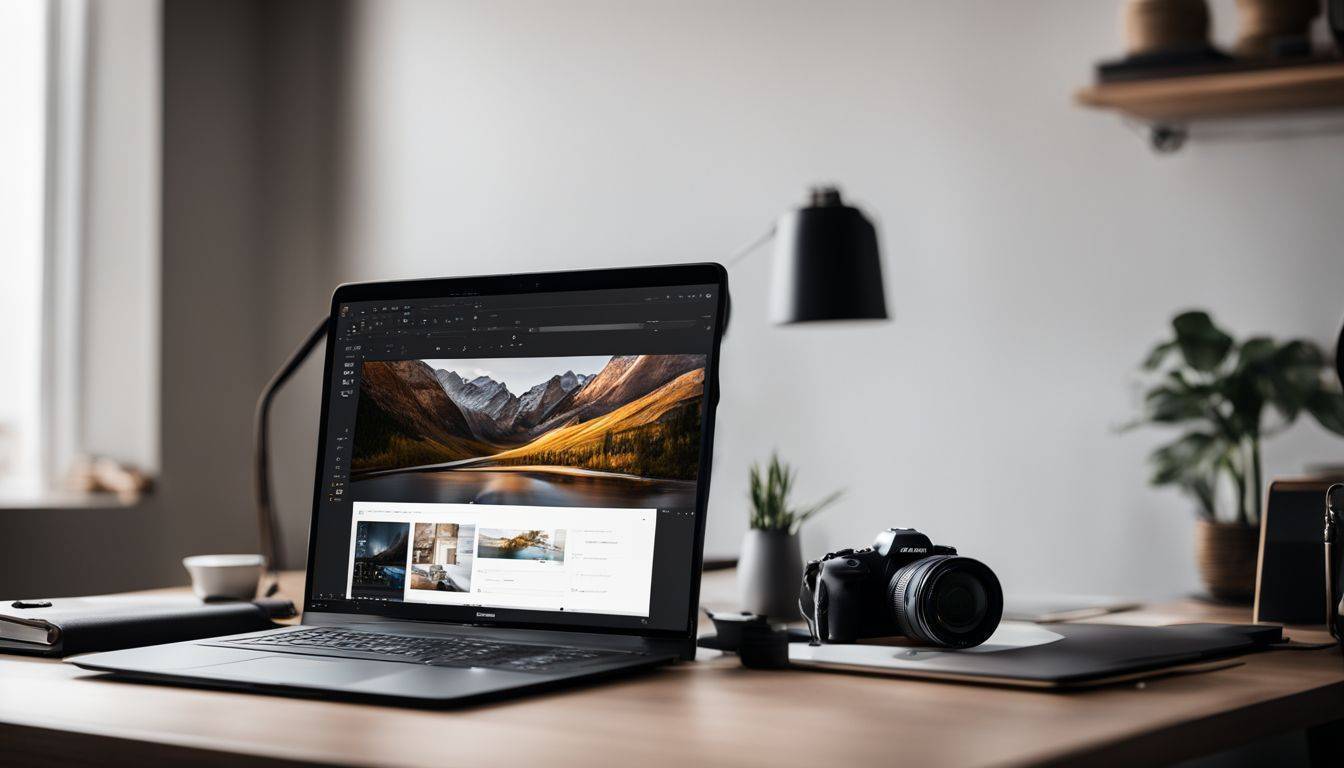Feeling the urge to share your ideas, passions or personal experiences with the world? Starting a blog is an amazing way to do just that. In fact, over 600 million blogs exist on the internet today and some bloggers even make a living out of it! This article will provide you with a simplified step-by-step guide on how to start your own personal blog and potentially turn it into a source of income.
Now, are you ready to leave your digital footprint in the blogging world?.
Key Takeaways
- Blogs let us share ideas and can make money too.
- To start a blog, you need to pick a topic and the right platform. WordPress is a good choice.
- Make your blog stand out with your own style and great posts.
- Get more people to see your blog by using social media or teaming up with other bloggers.
- Make money from your blog with ads, selling others’ goods, or partnering with brands.
Detailed Step-by-Step Guide on Starting a Personal Blog (https://www. example. com/how-start-personal-blog/)
 Starting a personal blog can seem hard, but it’s easier with the right steps. Use these to get started:
Starting a personal blog can seem hard, but it’s easier with the right steps. Use these to get started:
- Choose what you want to talk about on your blog (your niche)
- Pick a platform for your blog – WordPress is good
- Think of a unique name for your blog
- Set up tools that won’t cost much
- Start writing posts that will catch people’s eye.
- Plan when to put each post up with a content calendar
- Make sure people will find your posts: use SEO.
- Keep in mind that you can make money from your blog
- Get more people to look at what you write
- Turn the traffic into income: use ads or partner with brands.
- Start earning from your personal blog
https://www.youtube.com/watch?v=X2-v-NnZrVE
Choosing a Platform for Your Blog

Selecting the right platform for your blog is essential as it serves as your digital canvas – consider using a reliable blog hosting service, opt for an available and catchy domain name, select a visually appealing theme that suits your content, and customize it to reflect your unique style and voice.
Consider a blog hosting service
A blog hosting service holds your blog on the internet. Think of it as a house for your blog. You should pick a good one like WordPress.com, which is quite popular. They will set up the complex web stuff and you can focus on blogging.
Your host must suit your needs well. Some hosts are great but expensive, others are cheap but not so great. Be smart about picking your host: think about cost, reliability and tools they give to design your site with ease.
Decide on a domain name
Picking a domain name is an important step. It should be short and easy to remember. Make sure it matches your blog’s topic. A .com extension works best. Try to add words that people might search for online.
This helps your SEO, which means more people can find your site easily.
Choose a theme or design
Pick a blog theme or layout. This step lets you show your style without needing code know-how. The look of the blog should match what you’re writing about and why. You can change colors, fonts and even add your own logo.
Make sure your blog looks good on phones and all devices.
Customize your blog
Making your blog reflect who you are is key. This step is called “Customize your blog”. First, select a custom template that fits your style. Next, design a unique logo to mark your posts.
Play with the layout and color scheme until it feels right. Think about who will read your blog while doing this. Make sure the look of your blog matches what they like. Plugins and widgets can also be used to add more cool features to make your blog stand out even more!
Creating Quality Content
Creating quality content is a key step in establishing your blog. Start by developing a content calendar to organize and plan your posts. Optimize each piece of content for SEO, ensuring it’s found by search engines and reaches your desired audience.
Always write with authenticity and passion – this gives life to your words and helps you connect deeply with readers on a personal level.
Develop a content calendar
A content calendar is a key tool for your blog. It helps plan and order your posts. You first set clear goals. Then you create a layout or use a ready-made template. Next, pick where you’ll share each post.
The best part about the content calendar is its flexibility. You can swap around posts as needed. This way, quality comes before how many posts you have. Plus, it keeps your posting steady and on time.
Also, this handy tool brings all your creative thoughts into one space! With it, managing ideas gets easy as pie! And don’t forget about organizing the steps to make each post happen!
If blogging seems like too much work at times, try out a content calendar! It may just turn things around for you in no time!
Optimize your content for SEO
You want your blog to show up in search engine results. So, you need to use SEO! SEO makes your blog easy for people and search engines to find. Start with keyword research. Find out what words or phrases people use when they look for content like yours on the internet.
Use these keywords in your posts.
Next, make sure each post is about a clear topic. This helps search engines understand what you’re talking about. Also, add meta tags and titles that match your topic and include your keywords.
Lastly, think about backlinks – other websites linking back to yours. They can give more power to your blog in the eyes of search engines!
In short, SEO will help raise your blog’s rank on search engines like Google or Bing so more people can see it! Your aim should be writing blogs that both people and computers love.
Write with authenticity and passion
Pour your heart into every blog post you write. Show your true self to your readers. Real words and feelings engage them more than anything else. Keep it real, honest and full of spirit.
Let them feel the zeal in your writing each time they read your posts. Be genuine in sharing ideas or telling stories. Readers can tell if a blogger is heartfelt or not when they write their blogs.
Promoting Your Blog
Boost your blog’s visibility using social media platforms. Establish relationships with fellow bloggers for collaboration opportunities. Prioritize engaging with your audience to cultivate a sense of community around your content.
Utilize social media
Use social media to make your blog known. This tool will help you reach the people who might like what you have to say. Put a link of your blog on all of your profiles. You can get more visits this way.
There are nine ways for doing this well, so find out about them and use them. Push your brand through your blog posts on social media and make it big!
Collaborate with other bloggers
Team up with other bloggers to boost your blog. This step is key to gain more of an audience for your blog. It can also grow the number of people who get emails about your posts. Look for bloggers who share interests with you or write on similar topics.
You can trade guest posts, do joint projects, and help each other out on social media. Sharing tips and advice will help both blogs do better in the long run.
Engage with your audience
Talking to your blog readers is a good idea. This means you must reply to their comments and messages. Go where they hang out online. It could be on social media or other blogs. Listen to what they say about your blog posts.
If they want something different, make changes to please them. All this will help you get more people visiting your personal blog often. More visits mean more chances to make money from your site!
Monetizing Your Blog
Monetizing your blog can be a game-changer, transforming your passion into profits through affiliate marketing, sponsored content, or partnerships with brands. Ready to learn more? Dive in!
Consider affiliate marketing
You can make money with your blog using affiliate marketing. This is where you share products from a business on your blog. When people buy these products, you earn some pay! It’s like being a salesperson, but online.
First, build your website or blog to show off the goods. Pick an industry and narrow down who you want to sell to. Do some research to find out what they might like best before promoting it on your site.
Offer sponsored content or ads
You can earn money from your blog with ads and sponsored content. Brands pay you to talk about their products in your posts. They might give you a new product for free or pay you money.
This way, both of you gain something. You get the product or cash, and they get more people knowing about what they sell. Sometimes, brands will want to put ads on your blog too. Ads are small pictures or words that promote a company’s products or services.
Each time someone clicks on these ads, you make some money!
Partner with brands or businesses
You can make money with your blog by working with brands or businesses. This is called monetization. Some ways to do this include creating sponsored content and affiliate marketing.
Sponsored content is when a brand pays you to talk about their product or service in your blog post. In affiliate marketing, you get a piece of any sales made through links you share on your blog.
You can also team up with brands for special projects like ad campaigns or influencer marketing events. To catch the eye of these brands, make sure your blog has lots of traffic and people who comment and like your posts.
Conclusion
Blogging opens doors. It’s a path to share your thoughts and make money. Ready, set, blog!
FAQs
1. What do I need to start a personal blog?
To start a personal blog, all you need is a computer with internet access, and an idea for what you want to write about.
2. How can I choose the best topic for my blog?
Choose a topic that interests you and one that you are knowledgeable about or willing to research more.
3. Do I have to pay money to start my own blog?
While there are free blogging platforms available, investing in your own domain name and hosting service can make your blog appear more professional.
4. Can I earn money from my personal blog?
Yes, through methods such as affiliate marketing, sponsored posts, selling products or services directly on your site as well as ad revenue.
5. How often should I post on my personal blog?
It’s good practice to post new content at least once a week on your personal blog – consistency helps engage regular readers while attracting new ones.
